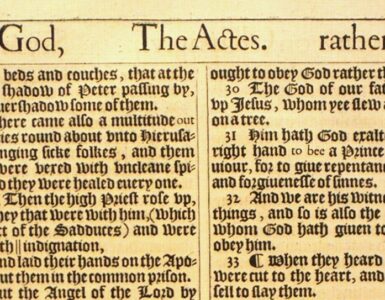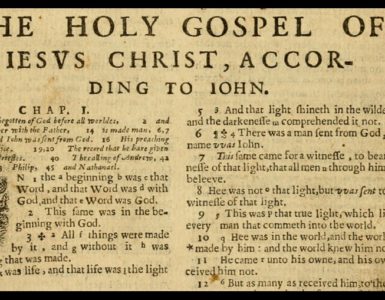Alexander Scott was born in Washington County, Pennsylvania, June 16, 1826. He graduated Jefferson College and taught school before completing studies at Princeton Seminary in 1859. He was ordained an evangelist and supplied the Presbyterian Church in Arcata, California, 1859-1862, before returning to Princeton Seminary for graduate studies, 1862-1863. He then was an evangelist and teacher in Philadelphia 1863-1881. Before retirement in 1905 Scott had returned to the west coast and held short-tenure positions teaching before ending his work with thirteen years at Albany College in Oregon as professor of Greek. He died February 16, 1915 at the age of 88.
It is a brief sermon that with some modernization of terminology and composition would make a fine charge to a candidate for ordination and/or installation. It was published in The Pacific Expositor, May 1861, pages 478-484. The editor of the journal was William A. Scott, but the two do not appear to be related.
Barry Waugh
Editor’s Introduction: “We present here as full extracts from this discourse as the limit of our pages will allow. Mr. Scott was not able to be present in person to comply with the order of the Presbytery of California to deliver a discourse on the above subject, so he prepared it, sent the manuscript, and it was read before that body at their last meeting. The Presbytery voted unanimously their thanks to Mr. Scott for his zeal in the matter, and for the able and discriminating discourse which he had prepared on the subject assigned to him.”
An Efficient Ministry
Ministers are Christ’s ambassadors, whom he has sent forth to beseech a sinful and rebellious world to be reconciled to God; and if they are successful in the embassy on which they are sent—if they succeed in persuading men to be reconciled to God and inducting them in the path that leads to heaven and eternal happiness—then they accomplish the work to which they are called, and constitute “an efficient ministry.”
This, “An Efficient Ministry,” is the theme assigned me by the Presbytery of California for the present occasion. The subject, however, as assigned, is somewhat indefinite, and would admit of various methods of treatment. For the sake of more definiteness, therefore, I propose to consider some of the principal characteristics of an efficient ministry.
First: An efficient minister of the gospel is called of God, as was Aaron. His commission is from on high, to proclaim the good news and glad tidings of life and salvation to a lost and perishing world. The Great Head of the Church has said to him, Go preach my Gospel—go beseech rebellious man to be reconciled to God. If he has the necessary qualifications—the requisite bodily, mental and spiritual gifts—and an earnest desire to promote the glory of God, by devoting himself to the work of the ministry, he cannot expect the blessing of God upon his labors. He must be called of God before his ministry will be efficient. But such a call does not imply that a man has heard an audible voice from heaven, saying, “Go preach the gospel”; nor does it imply that he has come under some unmistakable heavenly impulse, received in a vision. If God gives a man the bodily, mental and spiritual aptitudes of a minister of the gospel, and then puts it into his heart to devote himself to the ministry, he has reason to think that he is called to preach the gospel of the grace of God. If he looks abroad over a perishing world, and his soul yearns over them—if he sees millions of human beings perishing for lack of the bread of life, and earnestly desires to give them that bread—if he hears the Macedonian cry, “Come over and help us,” and like Paul, is fully persuaded that it is his duty to obey that call, he may assuredly understand that the Lord has called him to go over into Macedonia and preach the gospel. And if he is thus called, like Paul, his ministry will be efficient in the conversion of many souls.
Second: The man who is thus called to preach the gospel, is a good man. He is a man of earnest and devoted piety— “an Israelite indeed, in whom is no guile.” He is a living exemplification of the doctrines which he preaches, and enforces, by his example, the precepts which he enjoins upon his hearers. It is an essential qualification of an efficient minister that he be a good man. An undevout ministry is not only useless, but absolutely injurious. It not only fails to accomplish the purpose for which the ministry was instituted, but it also brings religion into disrepute. The people of the world judge of religion by its professors [believers], and especially its ministers; and if these do not show by their walk and conversation that it is a reality and not a pretense, they need not expect to persuade the world to embrace the doctrines, which they profess and preach. As long as the people lack confidence in a minister’s sincerity, they will be unmoved by his preaching. Take away the conviction that a minister is a good man, and you at once destroy his usefulness—you render his ministry inefficient. But persuade the people that he is a good man—a man who is devotedly pious—and you give him an element of power which he could not otherwise have—you make him, to some extent, an efficient minister of the gospel. This is abundantly confirmed by observation and experience; and it is not unfrequently that men are heard expressing themselves thus: “I believe and feel what that preacher says, because he appears to be so sincere in every word he speaks; and as I know him to be a good man, his sincerity inspires my confidence and affects my heart.”
Third: An efficient minister is a good man, full of the Holy Ghost. He is a man who is constantly under the influence of the Spirit of God. He has received an unction from on high, and speaks the “Word in demonstration of the spirit and of power.” The fire of devotion burns continually on the altar of his heart, and out of the abundance of his warm heart, he utters words that burn. The Spirit teaches him all things, even the deep things of God, and illuminates his understanding, so as to enable him to see wondrous things out of God’s law. He is full of the Bible and Bible-truth, and his preaching is preeminently Scriptural.
Fourth: An efficient minister is also full of faith, a fruit of the Spirit. He has a strong and abiding conviction of the truth of the gospel which he preaches. And he is not only persuaded of its truth, but also of its power over men’s souls. He has felt its power in his own soul, and is persuaded that it will be no less potent in others; and thus believing, he preaches with effect. His faith gives him power with God, and the power of God over the souls of men. The man of strong faith wields an influence that moves the world—an influence that is not human, but divine. It was Paul’s strong faith that made him such a valiant soldier of the cross, and enabled him to triumph over all opposition. He knew whom “he had believed, and was persuaded that he was able to keep that which he had committed unto him”; and hence his boldness in proclaiming the whole truth. Paul was not one of your cowardly preachers. He was not afraid of injuring his popularity by telling the truth. He felt that he was called to declare the whole counsel of God, whether men would be pleased or not, and he never kept back that part of the gospel which is the least in accordance with man’s depraved nature. He never omitted to preach Christ and him crucified, because it was a stumbling block to the Jews and foolishness to the Greeks, but always declared the whole counsel of God, whether men would hear, or whether they would forbear. He believed and preached the whole gospel. He was firmly persuaded that it was the power of God unto salvation, to all who embraced its doctrines; and thus believing, he preached with a power, against which the combined powers of earth and hell could not prevail. Though he was beaten with rods, imprisoned, and even threatened with death; yet none of these things moved him, neither counted he his life dear unto him, if he could only finish his course with joy, and the ministry, which he had received of the Lord Jesus, was to testify the gospel of the grace of God. He knew that “all things worked together for good to them that love God, to them who are the called according to his purpose,” and that his light affliction, which was but for a moment, would work for him a far more exceeding and eternal weight of glory; and thus believing, he continued to preach the gospel with boldness and efficiency.
Fifth: The man who is thus full of faith, preaches Christ and him crucified. He is an ambassador of Christ, sent in his stead, by the court of heaven, to beseech men to be reconciled to God. The gospel is his message of reconciliation, which he proclaims to a sinful and rebellious world. He tells the condemned sinner how he can be restored to the favor of God and be justified in his sight. This he does by setting forth Christ and him crucified as the only ground of his justification. The burden of all his preaching is the plan of redemption through faith in the once crucified, but now risen and ascended Redeemer. The personal character and the official work of Christ constitute the sum and substance of his preaching. It was thus with the great Apostle of the Gentiles. The constant theme of his preaching, from the time of his conversion till his death, was Christ and him crucified; but it was not always treated in the same manner. His preaching was always adapted to the circumstances of the occasion and to the character and capacity of his hearers. This we see illustrated in his different methods of preaching in Jewish synagogues, before his own countrymen, in the Areopagus before the philosophical Athenians, and in Caesar’s judgment-hall before the Roman governor. When addressing the Jews his preaching abounds in allusions to their own rites and ceremonies; and when he is preaching to the heathen, who are without divine revelation, he refutes their objections by arguments drawn from the works of nature. In expounding his one great theme—Christ and him crucified—the whole natural and moral world affords him arguments and illustrations; but he never preaches himself. His speech and preaching were not with enticing words of man’s wisdom, but in demonstration of the Spirit and of power. (1 Corinthians 2: 4.) There was no pedantry in his sermons. He never indulged in abstruse philosophical and metaphysical disquisitions in order to make a display of his learning and talents. When he was philosophical or metaphysical, it was always that he might thus set forth and enforce some part of his one great theme.
Sixth: An efficient minister preaches Christ and him crucified with simplicity. The gospel is designed for all—for the unlearned as well as the learned—and in order that all may understand it, it must be preached with plainness. It must be so set forth as to be comprehended by all, who are possessed of ordinary intelligence. Its simple truths must be preached in plain and simple language. There must be no effort after high-sounding lectures, which are not understood by the masses. The man who ransacks Webster’s Unabridged Pictorial for high-flown language in which to express the simple truths of the gospel, may succeed in acquiring the reputation of a learned divine; but he will not be very likely to feed the lambs of the flock with the sincere milk of the Word. He may be a popular preacher, and be able to draw large congregations; but he will not become an efficient minister, unless his hearers have more than ordinary intelligence. Speaking in an unknown tongue will not edify the body of Christ.
Seventh: An efficient minister preaches the plain truths of the gospel with earnestness. He feels that he is dealing with solemn realities, and he does not treat them as fictions. He feels what he speaks, and shows by his manner of speech that he is in earnest. He is deeply impressed with the importance of the truths which he utters—has firm conviction of the magnitude of the interests which are at stake—and he does not set them forth in a cold and indifferent manner. He watches for souls, as one who must give an account; and feeling the weight of the responsibility that is resting upon him, he does not deal with the solemn realities of eternity as with the things of time, but sets them forth in an earnest and impressive manner, showing that he believes them to be realities and not fictions; and thus, he secures the attention of the careless and indifferent. The man who does not show by his manner of speaking that he believes every word he speaks, cannot expect others to believe. If he shows that he does not feel it himself, he need not expect others to feel. It matters not how learned he may be, if he treats divine realities as fictions of men, he need not expect his hearers to believe them to be other than fictions. If a minister would have others believe the momentous truths of the Bible, he must show that he believes them himself. These are some of the chief characteristics of an efficient minister. He is called of God—as was Aaron; he is a good man, full of the Holy Ghost and of faith, and preaches Christ and him crucified with simplicity and earnestness.
And here, my brethren in the ministry, the solemn question arises, How is it with us? Have we been called of God to this great, this momentous work—this work, than which a greater work never rested upon an angel of God—this work, from the responsibility of which even the archangel Gabriel might shrink? Do we show by our example, as well as by precept, that we are good men, full of the Holy Ghost and of faith? And when we stand up as ambassadors of Christ in his stead, beseeching men to be reconciled to God, do we set forth the gospel plan of reconciliation with simplicity and earnestness?
The position which we occupy is one of fearful responsibility, and it becomes us to take heed to ourselves, as well as to the flock over which the Holy Ghost has made us overseers. Upon us hangs not only the destiny of our own immortal souls, but also, in a great measure, that of those to whom we minister. To us is committed the preparation of souls for eternity—souls which are more valuable than the whole world—souls whose redemption cost no less a price than the precious blood of the eternal Son of God—souls which will live forever, either in the mansions of glory, or in the regions of woe.
It is no trifling matter, therefore, to be a minister of the gospel—an ambassador of Christ—sent forth to beseech a sinful and rebellious world to be reconciled to God; and it becomes us to take good heed how we discharge the duty assigned us, so as to be able to render a good account at the bar of God.
Let us, therefore, examine again, and see if we have been called of God—if we are good men, full of the Holy Ghost and of faith—and if we preach Christ and him crucified with simplicity and earnestness. If we possess these qualifications of an efficient ministry, we have a right to expect that many people will be added to the Lord through our instrumentality—that we will be the means of turning many to righteousness, and will shine as the brightness of the firmament, and as the stars for ever and ever.





